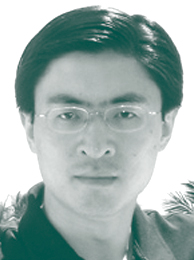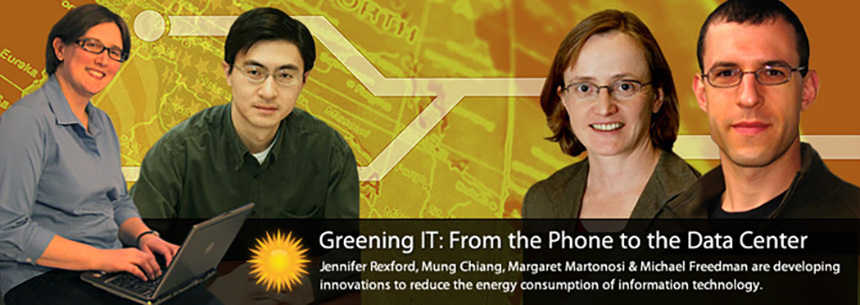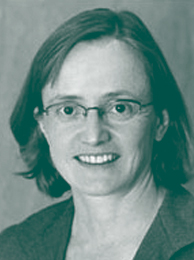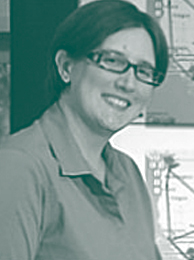Greening IT: From the Phone to the Data Center
2008-13 New Investigator Award
The Greening IT initiative is developing methods to reduce Information Technology (IT) energy consumption. The team is creating prototype techniques to both reduce energy consumption within discrete data centers and to improve the efficiency of data traffic between centers. The researchers have received a $100,000 Google Innovations Award as well as funding from the National Science Foundation to continue their work.
Information technology consumes 2.5% of the world’s electricity, translating to one billion tons of CO2 produced annually. In the United States, data centers alone consume more than 60 billion kilowatt hours a year—equivalent to the consumption of the entire transportation manufacturing sector.
Under current efficiency trends, this gigantic amount of energy will nearly double by 2011 for an overall electricity cost of $7.4 billion per year. IT plays a crucial role in reducing other sources of energy consumption by enabling remote collaboration in lieu of frequent travel and by providing energy monitoring and sensing technologies. These activities lead to further demands on the world’s computing and communications infrastructure even as society’s “greening” continues.
This project investigates how to reduce IT energy consumption from an end-to-end perspective from the mobile phone to the data center. This initiative aims to build a comprehensive research area on Green IT to help meet the target of reducing IT energy consumption by over one‐third without damaging the economic productivity offered by IT and to make the ever more pervasive IT products increasingly green.
Research expertise draws from computer architecture, communication networks and wide‐area services, including both theoretical techniques and systems prototyping.
Educational Impacts
Undergraduate interns working on the Greening IT project have modeled dynamic load balancing across data centers and green backbone networks. Undergraduate intern Will Fisher joined the networking group at Google New York City after graduation.
Graduate student Ozlem Bilgir co-authored work that received the best paper award at the International Green Computing Conference in 2010.
In the fall of 2010, Martonosi taught a new course (ELE 580A) entitled “Green Information Technology”. The courses “Advanced Computer Networks” (COS 561) and “Distributed Algorithms and Optimization Methods for Engineering Applications” (ELE 382) have been updated to include segments on green networking.
Other Outcomes
The project has resulted in the following publications to date:
S. Narayana, J. Jiang, J. Rexford, and M. Chiang. Distributed Wide-Area Traffic Management for Cloud Services. Submitted, November 2011.
O. Bilgir, M. Martonosi, and Q. Wu. Exploring the Potential of CMP Core Count Management on Data Center Energy Savings. 3rd Workshop on Energy Efficient Design (WEED 2011), June 2011.
E. Koukoumidis, L.S. Peh, and M. Martonosi. SignalGuru: Leveraging Mobile Phones for Collaborative Traffic Signal Schedule Advisory. 9th International Conference on Mobile Systems, Applications, and Services (MobiSys 2011), June 2011. Best Paper Award
R. Wang, D. Butnariu, and J. Rexford. OpenFlow-Based Server Load Balancing Gone Wild. Proceedings of Workshop on Hot Topics in Management of Internet, Cloud, and Enterprise Networks and Services (Hot-ICE), March 2011.
W. Fisher, M. Suchara, and J. Rexford. Greening Backbone Networks: Reducing Energy Consumption by Shutting Off Cables in Bundled Links, ACM SIGCOMM Workshop on Green Networking, September 2010.
K. Le, O. Bilgir, R. Bianchini, M. Martonosi, and T.D. Nguyen. Capping the Brown Energy Consumption of Internet Services at Low Cost. International Green Computing Conference (IGCC 2010), August 2010. Best Paper Award
K. Le, O. Bilgir, R. Bianchini, M. Martonosi, and T.D. Nguyen. Managing the Cost, Energy Consumption, and Carbon Footprint of Internet Services. Proceedings of ACM SIGMETRICS 2010, June 2010.
I. Kamitsos, L. Andrew, H. Kim, and M.Chiang. Optimal Sleep Patterns for Serving Delay Tolerant Jobs, ACM Int’l Conf. on Energy-Efficient Computing and Networking 2010, April, pp.1-10. doi:10.1145/1791314.1791320
Participating Department
Collaborating Institutions
- Bell Labs, Alcatel-Lucent, USA (Hongseok Kim)
- Chinese University of Hong Kong
- Swinburne University of Technology, Australia (Lachlan Andrew)
- Université Catholique de Louvain, Belgium (Paschalis Tsiaflakis)
Related Media and Press Coverage
- Research: Using Smartphones for Frugal Driving
- Engineers Work to Ease Internet Data Flow as Demand for Video Grows
- Professor Jennifer Rexford Announced as Recipient of Graduate Mentoring Award
Participants










